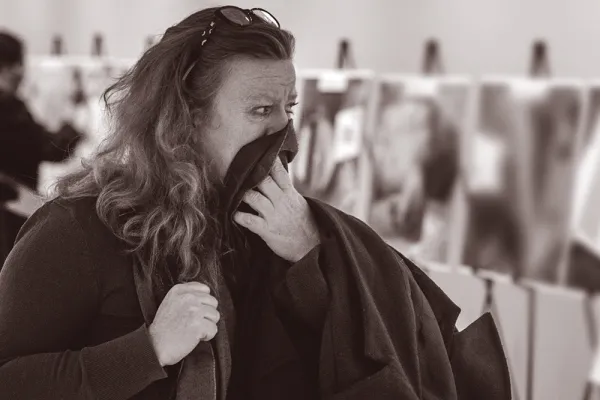The Conflict in Syria: Assessing the Human Toll of Mass Violence
Events

Published February 5, 2016
As the situation in Syria becomes increasingly desperate (on Wednesday, February 3, the United Nations suspended peace talks aimed at ending the five-year civil war), members of the Smith and Western Massachusetts community have a rare opportunity to hear first-hand from leading international experts on the evolving crisis and its human costs.
Three prominent activists and scholars with direct connections to Syria—including Robert Ford, President Barack Obama’s outspoken U.S. Ambassador to Syria from 2011 to 2014—will offer a panel discussion on “Accounting for Torture in Syria” at 5 p.m. Thursday, Feb. 11, in the Campus Center Carroll Room. The event is open to the public at no charge.
The panel discussion opens a two-week exhibition of the “Caesar” photographs—a powerful and striking collection of images, photographed in Syria between May 2011 and August 2013 and then smuggled out of the country, documenting victims of torture by the government of Syria. (Both the panel discussion and exhibition include graphic content.)
Steven Heydemann, the Janet Wright Ketcham ’53 Chair of Middle East Studies at Smith, says the panel and the photo exhibition are designed to call attention to the systematic use of torture by the Syrian government and highlight the importance of holding the regime accountable for its massive abuses of human rights. “More than 250,000 people have already died in this conflict,” Heydemann said, “and more than 11 million have fled their homes. This panel—and the exhibition of the extraordinary “Caesar” photos—are designed not only to focus necessary attention on the conflict, but also to inspire action.”
About the February 11 panel
Three prominent activists and scholars with direct connections to Syria will discuss war crimes, human rights and the human cost of the Syrian conflict in a panel presentation on “Accounting for Torture in Syria” at 5 pm Thursday, Feb. 11, in the Campus Center Carroll Room at Smith College. The event is open to the public at no charge.
The panel, which will be moderated by Heydemann, will feature Robert Ford, former U.S. Ambassador to Syria (2011-14), and now an outspoken critic of the Obama administration’s Syria strategy; Mouaz Moustafa, executive director of the Syria Emergency Task Force; and Sarah Leah Whitson, executive director of the Middle East and North Africa division of Human Rights Watch.
Robert S. Ford served as the U.S. ambassador to Syria from 2011 to 2014, leading U.S. efforts to develop and implement policy, and developing common strategies with European and Middle Eastern allies to try to resolve the Syria conflict. Ford was well known and highly regarded for his courage and his deep personal commitment to the Syrian people. He met regularly with leaders of the Syrian opposition, earning displeasure from pro-Assad forces and eventually facing death threats. Since resigning his post in 2014, he has called on the Obama administration to engage more actively in support of the Syrian opposition. Before his Syria appointment, Ford served as the Deputy U.S. Ambassador to Iraq from 2008 to 2010 and also served from 2006 until 2008 as the U.S. Ambassador to Algeria, where he boosted bilateral education and rule of law cooperation.
Mouaz Moustafa is executive director of the Syrian Emergency Task Force. Born in Damascus, he came to the United States as a young teenager and now travels regularly between Washington, D.C., and Syria, where he manages in-country peace work, training programs and emergency relief. Moustafa organized a 2013 visit to Syria by Sen. John McCain and other top officials, prompting a complaint from the Syrian government, who said that the visitors entered without visas.
Sarah Leah Whitson is executive director of Human Rights Watch’s (HRW) Middle East and North Africa division and has been involved with the organization’s “If the Dead Could Speak” report and exhibitions of the “Caesar” photos. (Additional information about the exhibition is below.) In her role at HRW, she oversees the work of the division in 19 countries, with staff located in 10 countries. She has led dozens of advocacy and investigative missions throughout the region, focusing on issues of armed conflict, accountability, legal reform, migrant workers and political rights.
About the “Caesar” photographs
From May 2011 to August 2013, an official photographer for Syria’s military police secretly collected 55,000 images of more than 6,700 victims of torture by the government of Syria. In 2014, the photographer, known as “Caesar,” defected from the military and was smuggled out of Syria, together with his digital archive of photographs.
The “Caesar” photographs eventually made their way to Human Rights Watch, which documented their provenance in a major report, “If the Dead Could Speak.”
In the past 18 months, the images have become one of the most striking documents of the horrific situation in Syria and an irrefutable record of the human costs of the Syrian conflict.
The “Caesar” photographs will be on display at Smith for just two weeks, from February 11 to February 23. The exhibition will take place in the Campus Center Nolen Art Lounge and is open to the public. (The exhibition includes graphic content.)
The exhibition has previously been displayed at the United Nations and at the United States Holocaust Museum in Washington, D.C., among other venues.
Although the photos are graphic, Heydemann, who organized the exhibition at Smith, believes that the visual component will resonate at the college.
“These photographs are among the most compelling evidence ever collected of the Assad regime’s complicity in war crimes and crimes against humanity,” said Heydemann, who serves as the college’s inaugural Janet Wright Ketcham ’53 Chair of Middle East Studies. “These photos have the power to change opinions. They demand to be seen here at Smith.”